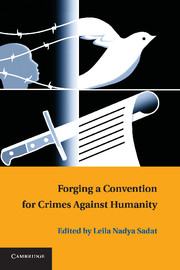Book contents
- Frontmatter
- Contents
- Figures and Maps
- Crimes Against Humanity Initiative: Steering Committee
- Biographies of Contributors
- Foreword
- Preface and Acknowledgments
- Crimes Against Humanity and the Responsibility to Protect
- 1 History of Efforts to Codify Crimes Against Humanity
- 2 The Universal Repression of Crimes Against Humanity before National Jurisdictions
- 3 Revisiting the Architecture of Crimes Against Humanity
- 4 The Bright Red Thread
- 5 Gender-Based Crimes Against Humanity
- 6 “Chapeau Elements” of Crimes Against Humanity in the Jurisprudence of the UN Ad Hoc Tribunals
- 7 The Definition of Crimes Against Humanity and the Question of a “Policy” Element
- 8 Ethnic Cleansing as Euphemism, Metaphor, Criminology, and Law
- 9 Immunities and Amnesties
- 10 Modes of Participation
- 11 Terrorism and Crimes Against Humanity
- 12 Crimes Against Humanity and the International Criminal Court
- 13 Crimes Against Humanity and the Responsibility to Protect
- 14 Re-enforcing Enforcement in a Specialized Convention on Crimes Against Humanity
- 15 Why the World Needs an International Convention on Crimes Against Humanity
- Appendices
- Testimonials and Endorsements
- Index
- References
11 - Terrorism and Crimes Against Humanity
Published online by Cambridge University Press: 01 June 2011
- Frontmatter
- Contents
- Figures and Maps
- Crimes Against Humanity Initiative: Steering Committee
- Biographies of Contributors
- Foreword
- Preface and Acknowledgments
- Crimes Against Humanity and the Responsibility to Protect
- 1 History of Efforts to Codify Crimes Against Humanity
- 2 The Universal Repression of Crimes Against Humanity before National Jurisdictions
- 3 Revisiting the Architecture of Crimes Against Humanity
- 4 The Bright Red Thread
- 5 Gender-Based Crimes Against Humanity
- 6 “Chapeau Elements” of Crimes Against Humanity in the Jurisprudence of the UN Ad Hoc Tribunals
- 7 The Definition of Crimes Against Humanity and the Question of a “Policy” Element
- 8 Ethnic Cleansing as Euphemism, Metaphor, Criminology, and Law
- 9 Immunities and Amnesties
- 10 Modes of Participation
- 11 Terrorism and Crimes Against Humanity
- 12 Crimes Against Humanity and the International Criminal Court
- 13 Crimes Against Humanity and the Responsibility to Protect
- 14 Re-enforcing Enforcement in a Specialized Convention on Crimes Against Humanity
- 15 Why the World Needs an International Convention on Crimes Against Humanity
- Appendices
- Testimonials and Endorsements
- Index
- References
Summary
INTRODUCTION
International law currently embodies universal and strongly articulated support for the positivist premise that “any acts of terrorism are criminal and unjustifiable, regardless of their motivation, whenever and by whomsoever committed and are to be unequivocally condemned.” The UN General Assembly reaffirms that “no terrorist act can be justified in any circumstances,” and regional instruments adhere to the same legal premise. The security, stability, economic vitality, sovereignty, political independence, and citizen safety of all States are accordingly protected against terrorist acts, irrespective of how democratic or human rights abiding the government in question is. The notion that States must use their domestic processes to cooperate together in the investigation and punishment of terrorist acts therefore reflects the truism that acts of terrorism violate the essential precepts of civilization.
As a matter of qualitative jurisprudence, terrorist offenses are on substantive par with the grave breaches provisions of the 1949 Geneva Conventions, the 1948 Genocide Convention, and the provisions of the Torture Convention; the same aut dedere aut punire obligation that applies to grave breaches, genocide, and torture also applies to terrorism. If a terrorist is found on the territory of a State Party, that State has an affirmative duty arising from the modern multilateral framework either to extradite the terrorist suspect to another State that itself has the motivation and personal jurisdiction to adjudicate the offender, or in the alternative it must “without exception whatsoever and whether or not that offense was committed in its territory … submit the case without undue delay to its competent authorities for the purpose of prosecution through proceedings in accordance with the laws of that state.”
- Type
- Chapter
- Information
- Forging a Convention for Crimes against Humanity , pp. 262 - 278Publisher: Cambridge University PressPrint publication year: 2011
References
- 1
- Cited by



